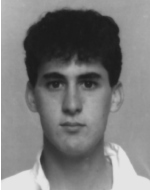King, Boaz
Son of Pnina and Yona. Born on 18.12.1969 in Rishon Letzion to his parents, in a family of three, he studied and was educated at the Yefe Nof Elementary School in Rishon Letzion and continued at the Comprehensive School of Electronics and Telecommunications. At the age of 16, his family moved to Holon, where he continued his studies in Rishon LeZion and at the same time joined the Scouts movement in the Sorek tribe and continued to work as a guide to social activities, singing evenings and parties. He loved music a lot and listened to David Bowie’s songs He was a very wide-ranging member, who radiated warmth and friendship and loved his sense of humor, and was drafted into the IDF in late January 1988 and assigned to the Military Police Corps. Boaz completed a police course, completed high grades, and was assigned to serve as a policeman in the detention facility in the Gaza Strip, and his commander wrote: “Boaz carried out a military training course, His work in sensitivity, faithfully and with respect for human dignity. “On August 8, 1988, Boaz fell during his service in a fatal road accident, overturning a vehicle he had traveled after spending time with his friends. He was laid to rest in the military cemetery in Holon. Survived by his parents and two brothers – Yaakov and Oded. In a letter of condolence to the bereaved family, his commander wrote: “Boaz was devoted to his job, a pleasant and modest man, both commanders and soldiers liked and respected him.” His parents commemorated his memory in a literary corner about the Land of Israel in the Fifth Comprehensive School in Rishon Letzion, where he studied. Every year, on the anniversary of the Israel Defense Forces Memorial Day, other books are donated and enriched by this unique “literary corner.” His mother, Pnina Melech, wrote a book in his memory: “Until the Breath.” , His features and a little about his short life, the song “Longing for Boaz,” from the book, composed by Shaike Pikov, and performed by Racheli Deutsch, the song “They Were,” which was published in memory of the fallen. The red one, / in the black cellophane box, / lay in her weeping face. “
